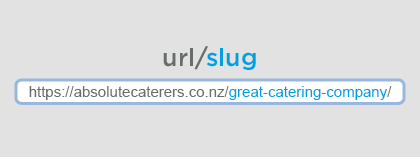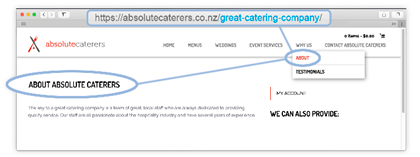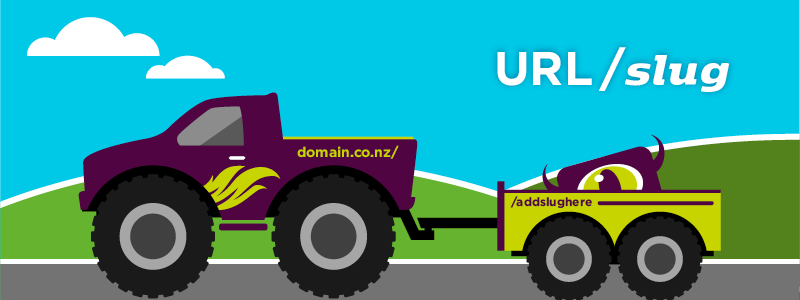No, you haven’t ended up in a gardening blog by accident! When we mention URL slugs, we’re not talking about the garden variety that wreak havoc on your lettuces, but rather the slugs which are a vital part of every web page.
Other names that slugs go by are meta titles or permalinks, but we like to use the term slug because here at Monster, we’re all about slimy, creepy things crawling around websites. We appreciate the vital role they play and instead of killing them, we nurture our slugs to help them do their job on your website.
From helping with indexing your website to making you more visible in search engines such as Google, knowing about URL slugs will ultimately assist you in your quest for a website that works as an efficient business tool.
Introducing the humble URL slug
Where do you find a slug on a webpage?
Instead of hiding beneath a rock or behind a plant pot, you’ll find URL slugs or page slugs, at the very end of the URL.
Domain name + slug as shown below:

They might be small, but don’t underestimate the power of the slug! They’re important because they give the unique address for each web page or blog post on your website and explains what each web page is about – which is crucial for Google.
So, what does a slug do?
Essentially, the slug is the business end of any URL. It gives a specific description of the content on that page which is vital in terms of what Google’s spiders can see.
When you have a website built for you by a team like Monster Creative, our copywriters will select a key phrase or page slug for each web page. This is an essential part of search engine optimisation (SEO) which is key to building an effective website. The key phrase selected for the page will also appear as the page slug and is chosen from the research that we carry out for your business/industry.
If your website pages are being written by the clever copywriters at Monster Creative, you can be assured that slugs are being used to their fullest.
Another thing to note is that slugs won’t always match the page title. Think of the page title as the user-friendly label and the slug as the clever way to build in a key phrase (for some extra SEO brownie points!).

Spiders and slugs
Each page slug also plays an important part of site indexation. When search engine spiders crawl through your web pages looking for information on your site, they pay careful attention to your page slug and compare it to the content on that page. If you’ve chosen a solid key phrase for your slug and created content that supports that key phrase, you’re more likely to be ranked higher on the SERP (search engine results page).
Protect your slugs!
Listen up, because this is a biggie. Once your site has gone live it’s imperative that you don’t change your page slugs. This can happen accidentally as you change or update the name of a website page. This can cause all sorts of issues including broken page links, resulting in lots of wasted time, stress, and potentially lost business for you.
Slug takeaways
So, take good care of your slugs because in the online world they play a vital part of your website’s habitat. Keep these key points in mind and you’ll be giving your slugs the best opportunity to thrive:
- Slugs help search engines index your website
- Choose slugs that boost SEO for each page
- Keep them short
- Never change your URL slugs
